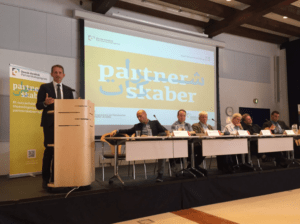News
Government presents vision for Danish-Arab partnership program
This article is more than 9 years old.
DAPP program has been instrumental to Denmark’s efforts in the MENA region

Kristian Jensen unveiling the DAPP vision (photo: Kristian Jensen)
Over 150 people were present yesterday as the Foreign Ministry unveiled its future plans for the Danish-Arab Partnership Programme (DAPP)
The foreign minister, Kristian Jensen, presented a vision for DAPP that focused heavily on partnerships, good governance and economic growth – particularly for the young people in the Middle East and North Africa (MENA).
“My meetings in the region bears witness to conflicts and contrasts, but also opportunities, and we have an ambition for Denmark to have a presence in those nations where we can make a significant difference,” said Jensen.
“We already have competencies and a network in the region and we have gained influence through DAPP that we can implement in the future.”
READ MORE: Danish program strengthening bonds in the Middle East
Down with DAPP
Jensen pointed to the DAPP possessing many of the tools needed to help alleviate some of the challenges that the region is facing, as well as being able to contribute with competencies such as improving democracy and human rights.
Via the DAPP, Denmark has made inroads into a number of countries in the MENA region in recent years, including Egypt, Yemen, Jordan, Tunisia, Morocco, Syria and Libya.
A 2015 report by the Danish consultancy NIRAS in co-operation with British Integrity Research (here in English), showed that DAPP has proved to be a relevant foreign policy instrument and an effective development catalyst since its establishment in 2003.






































